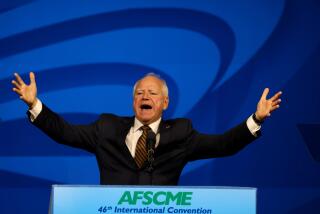Clinton Talks to Mill Workers, Focuses on Toll of Job Layoffs
- Share via
BERLIN, N.H. — Arkansas Gov. Bill Clinton courted New Hampshire paper mill workers Saturday, saying that government should fight layoffs with tax credits, while Iowa’s Sen. Tom Harkin told South Dakotans he was “the best hope rural America has.”
Former California Gov. Edmund G. (Jerry) Brown Jr. visited a boys club in New Hampshire, former Sen. Paul E. Tsongas of Massachusetts rallied his campaign workers nearby and Nebraska Sen. Bob Kerrey visited the West Coast. (Kerrey’s Los Angeles visit, B1).
On the Republican side, President Bush plans to visit this recession-bound state Wednesday, and commentator Patrick J. Buchanan has been stumping hard here as the focus intensifies on New Hampshire and its Feb. 18 presidential primary, the first in the nation.
Clinton focused his message Saturday on the grim toll of layoffs that has soured the mood here as he arrived in the region with an appeal to workers at three paper mills.
“If I were President today, if I were George Bush coming up here trying to save my bacon in New Hampshire,” Clinton said, he would offer an investment tax credit to mill operators in exchange for a long-term commitment to preserve jobs.
Clinton said Japan closes plants often without economic dislocation because “unlike in America, they don’t treat their workers like dirt.”
He said the United States should have a lifelong worker training and retraining program and stop treating workers like “disposable paper cups and napkins.”
Meanwhile, Tsongas rallied volunteers at his Manchester headquarters, then had them canvass the city the rest of the day. Brown was at the Nashua Boys Club and in Merrimack.
Harkin, campaigning for delegates in South Dakota’s Feb. 25 Democratic presidential primary, told sign-waving supporters in Sioux Falls that he was convinced he could “whip George Herbert Hoover Bush, I know I can.”
Harkin, a member of the Senate Agriculture Committee, said he has fought for farmers and small towns his whole career. “I believe I am really the best hope that rural America has,” he said.
More to Read
Get the L.A. Times Politics newsletter
Deeply reported insights into legislation, politics and policy from Sacramento, Washington and beyond. In your inbox three times per week.
You may occasionally receive promotional content from the Los Angeles Times.










